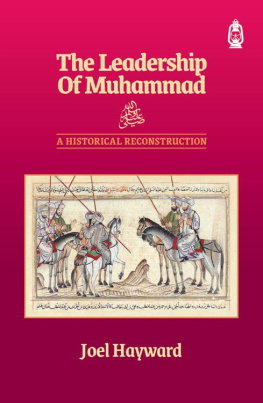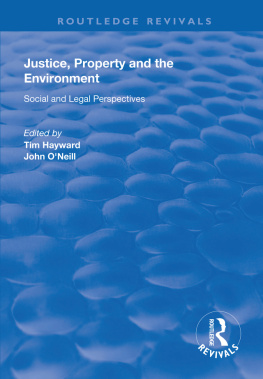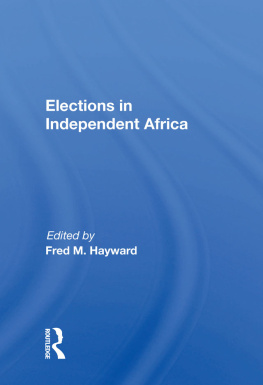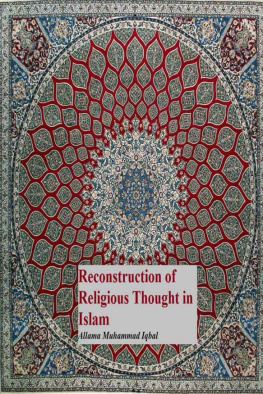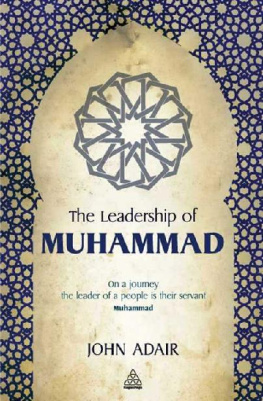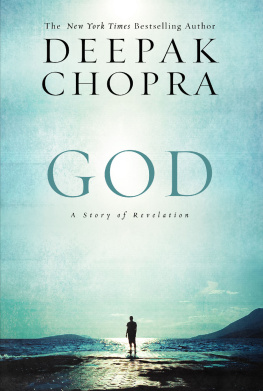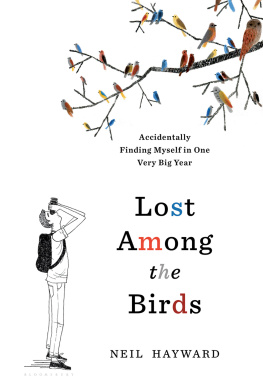Joel Hayward - The Leadership of Muhammad : A Historical Reconstruction
Here you can read online Joel Hayward - The Leadership of Muhammad : A Historical Reconstruction full text of the book (entire story) in english for free. Download pdf and epub, get meaning, cover and reviews about this ebook. year: 2021, publisher: Claritas Books, genre: Romance novel. Description of the work, (preface) as well as reviews are available. Best literature library LitArk.com created for fans of good reading and offers a wide selection of genres:
Romance novel
Science fiction
Adventure
Detective
Science
History
Home and family
Prose
Art
Politics
Computer
Non-fiction
Religion
Business
Children
Humor
Choose a favorite category and find really read worthwhile books. Enjoy immersion in the world of imagination, feel the emotions of the characters or learn something new for yourself, make an fascinating discovery.
- Book:The Leadership of Muhammad : A Historical Reconstruction
- Author:
- Publisher:Claritas Books
- Genre:
- Year:2021
- Rating:3 / 5
- Favourites:Add to favourites
- Your mark:
- 60
- 1
- 2
- 3
- 4
- 5
The Leadership of Muhammad : A Historical Reconstruction: summary, description and annotation
We offer to read an annotation, description, summary or preface (depends on what the author of the book "The Leadership of Muhammad : A Historical Reconstruction" wrote himself). If you haven't found the necessary information about the book — write in the comments, we will try to find it.
Joel Hayward: author's other books
Who wrote The Leadership of Muhammad : A Historical Reconstruction? Find out the surname, the name of the author of the book and a list of all author's works by series.
The Leadership of Muhammad : A Historical Reconstruction — read online for free the complete book (whole text) full work
Below is the text of the book, divided by pages. System saving the place of the last page read, allows you to conveniently read the book "The Leadership of Muhammad : A Historical Reconstruction" online for free, without having to search again every time where you left off. Put a bookmark, and you can go to the page where you finished reading at any time.
Font size:
Interval:
Bookmark:


1 2 3 4 5 6 7 8 9 10
Claritas Books
Bernard Street, Swansea, United Kingdom
Milpitas, California, United States

Claritas Books 2021
This book is in copyright. Subject to statutory exception and to the provisions of relevant collective licensing agreements, no reproduction of any part may take place without the written permission of Claritas Books.
First Published in March 2021
Typeset in Minion Pro 14/11
The Leadership of Muhammad: A Historical Reconstruction
By Joel Hayward
A CIP catalogue record for this book is available from the British Library
ISBN: 978-1-80011-989-5

Professor Joel Hayward is a New Zealand/British scholar, writer and poet who currently serves as Professor of Strategic Thought at the National Defense College of the United Arab Emirates. He has earned ijazas in Aqidah (Islamic theology) and Sirah (the Prophets biography). He has held various academic leadership posts, including Director of the Institute for International and Civil Security at Khalifa University (UAE), Chair of the Department of Humanities and Social Sciences (also at Khalifa University), Head of Air Power Studies at Kings College London, and Dean of the Royal Air Force College (both UK). He is the author or editor of fifteen books and monographs and dozens of peer-reviewed articles, mainly in the fields of strategic studies, the ethics of war and conflict, and Islamic and modern western history. His recent books include Warfare in the Quran (2012), War is Deceit: An Analysis of a Contentious Hadith on the Morality of Military Deception (2017), and C ivilian Immunity in Foundational Islamic Strategic Thought: A Historical Enquiry (2019).
Professor Hayward has given strategic advice to political and military leaders in several countries, has given policy advice to prominent sheikhs, and was tutor to His Royal Highness Prince William of Wales, Duke of Cambridge. In 2011 he was elected as a Fellow of the Royal Society of Arts and in 2012 he was elected as a Fellow of the Royal Historical Society. In 2016 he was named as the Best Professor of Humanities and Social Sciences at the Middle East Education Leadership Awards. Professor Hayward is also active in the literary arts and has published three books of fiction and four collections of Islamic poetry.
Disclaimer: The opinions expressed in this book are those of the author and do not reflect the views of the National Defense College or the United Arab Emirates government.
Contents

It was through Allahs mercy that you [Muhammad] have been able to deal with them so gently. If you had been stern and hard-hearted, they would surely have dispersed from around you.
Holy Quran
A leader is a shield to the people
Be humble towards one another, so that no one oppresses or is condescending to another person .
The one who shows humility, God elevates in the estimation of the people.
Advise me, O People
Muhammad before the Battle of Badr
Allahs Messenger s fought [ with us] in severe heat, struggling on our long journey, against the desert and the great strength of the enemy.
O Messenger of Allah! Shall I tie [the camels leg], or leave it loose and trust in Allah? He said: Tie it and put your trust in Allah.
[ It is] better for a leader to make a mistake in forgiving than to make it in punishing.

Introduction
Assessing the leadership effectiveness of any historical figure is always problematical for two reasons. First, it is likely that the records of his or her actions were written by either acolytes or enemies, and are therefore imbued with bias and distortion; and second, it is hard to establish whether successes or failures can reasonably be attributed to the leaders qualities or actions, or whether myriad other factors and the actions of other people played significant roles in the way events unfolded.
Making sense of the leadership attributes of military leaders is especially difficult because of the tremendous loyalties, passions and hatreds that emerge during and after wars. The only leaders more difficult to analyse than military leaders are religious saints and prophets. Take the itinerant Jewish rabbi known as Jesus, for example. Even describing his profession and ethnicity in this mundane but factually correct fashion might inflame temper in a Christian believer who considers him not only divine, but perfect.
These epistemological challenges frame the enormity of the task of trying to say something objective, meaningful and accurate about the leadership of an individual such as the Islamic Prophet Muhammad. He was both a military leader involved in wars that created new power structures and a prophet who ushered in dramatically original ways of understanding monotheistic religion and its relationship with politics.
Scholars approaching Muhammads life are at once confronted by the awkwardness that the very earliest extant sources that chronicle his life date from at least one hundred and forty years after his death in 632 CE, with almost no sources even of a fragmentary nature dating from within the first silent century or more. If his enemies or even neutral contemporary observers wrote accounts of his actions, they have not survived, with the exception of a few semi-coherent lines from Christian chroniclers in Greek, Syriac and Armenian that actually contradict the traditional Islamic narrative in places. It is equally problematic that the only sources written in the eighth and ninth centuries CE with sufficient detail to support the construction of a narrative were written by acolytes who supposedly based them on earlier sources that are now lost or on oral traditions. This increases the possibility that the sources are imbued with bias and possibly include distortion or fabrication which were added to create, or at least strengthen, a single desired viewpoint.
This should not be read as doubt on the historicity of Muhammad. On the contrary, it is clear from the archaeological, numismatic and documentary records that Arab armies spilled out of the Arabian Peninsula in the seventh century CE, undertook substantial warfare in neighbouring regions, and established new cultural norms and a powerful polity in the name of the recently deceased Prophet Muhammad. One can only conclude, therefore, that he did live and the new religion of Islam grew from his teachings.
Scholars should not avoid trying to say something meaningful about Muhammads life because of the possibility of subjectivity and bias in the sources and the fact that they date from the eighth and ninth centuries. Otherwise they would have to abandon trying to write about Alexander the Great, Julius Caesar, Jesus Christ, and many other historical figures. The key sources for their lives postdate the events by centuries, are equally problematic, and no less likely to contain subjectivity and bias. The earliest extant Greek source for Alexanders life, for example, is the Bibliotheca historica, written by Diodorus Siculus over 265 years after Alexanders death in 323 BCE. Even more inconvenient than this gap of 265 years is the fact that the oldest extant manuscript copy of the relevant section of the Bibliotheca historica (Book XVII) dates from the fifteenth century CE, over 1,500 years later.
Font size:
Interval:
Bookmark:
Similar books «The Leadership of Muhammad : A Historical Reconstruction»
Look at similar books to The Leadership of Muhammad : A Historical Reconstruction. We have selected literature similar in name and meaning in the hope of providing readers with more options to find new, interesting, not yet read works.
Discussion, reviews of the book The Leadership of Muhammad : A Historical Reconstruction and just readers' own opinions. Leave your comments, write what you think about the work, its meaning or the main characters. Specify what exactly you liked and what you didn't like, and why you think so.

